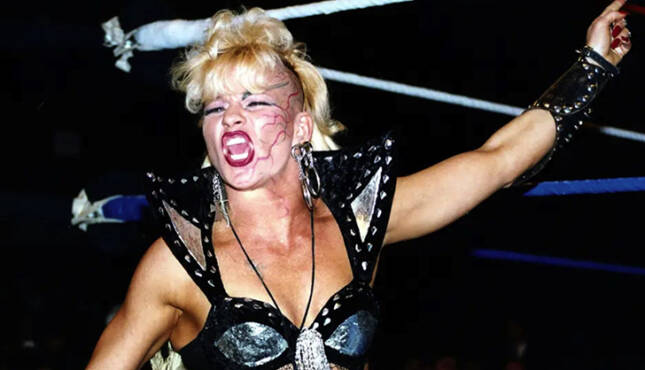

by Jeremy Thomas
In the years leading up to the famed “Attitude Era” of professional wrestling, there was arguably no women’s wrestler who stood out more than Luna Vachon. Vachon broke the mold for what it meant to be a woman in the wrestling business, proving to be a performer well ahead of her time. She fought against attitudes in the industry that said women had to be a particular type of performer, helping pave the way for what we celebrate as women’s wrestling today.
And yet, Luna also had more than her share of struggles, against both the constraints of what the industry wanted of her and her mental health, that shadowed her all the way until her untimely passing in 2010. Those sides of Luna are explored in-depth in Kate Kroll’s new documentary Lunatic: The Luna Vachon Story which screened at Fantastic Fest on Sunday. Kroll’s documentary goes deeper into the topic than the Dark Side of the Ring episode on Vachon did, giving an important figure in pro wrestling her due while also digging deep into her mental health battles.
With Lunatic, Kroll has the luxury of a feature-length film’s runtime, allowing her to more thoroughly explore Luna’s life as a whole than other versions of her story like the aforementioned Dark Side of the Ring episode or the 2021 documentary The Last Villains, which focused on the Vachon family as a whole. Kroll relies largely on interviews with the likes of Luna’s adopted father Paul “The Butcher” Vachon, David “Gangrel” Heath, Penelope Paradise, Kevin Sullivan, and Luna’s son Van Hurd.
It’s a very typical documentary format, using archival footage of Luna in the ring along with photos and, in places, clips from past interviews with Luna to allow her a voice in the film. The broad strokes of the story are familiar to most wrestling fans, but it’s the details where Kroll, herself a former wrestler, really gets a chance to shine. She hits all the familiar beats of Luna’s story but draws some great information out of the interviews, particularly with Luna’s father and son, to make her more than the tragic cautionary tale that a less sensitive documentary would jump on as an approach.
Kroll is interested in more than just the usual focus on the drug abuse that was rampant in the industry, particularly in the era Luna came into. She doesn’t shy away from that, nor the oft-made allegations against the Fabulous Moolah who trained and booked Luna early on (and has been accused of pimping out many of her trainees). But she doesn’t overly linger on them, taking more time to explore Luna’s bipolar disorder and how the lack of interest from WWE at the time and other promotions in actual women’s wrestling stymied her even as people like her, Alundra Blayze, and more began to set the stage for what wrestling is today.
The biggest thing that Lunatic has going for it is Kroll’s to treat Luna more like a person and less like a story. The complicated relationships that Hurd, Heath, Paradise, and even Blayze and Paul Vachon had with her are given more balance and weight, giving us a bigger and more balanced picture of who she was. It’s heartbreaking to hear the regret tinged in Paul’s voice when he talks about some parts of her life, but Kroll never lets the film become over-reliant on the tragedy of Luna’s life; everyone remembers good times, and those get the chance to be told.
The beginning and end of the film features former Raven Lake and others talking about the impact Luna brought to the business, and how inspirational she was to others. It adds an uplifting bookend to the story of a woman who may never had the chance to reach the heights that she deserved in the industry she loved, but ultimately led the way for others that helped make the business something that many believe she would have loved even more.
With Lunatic: The Luna Vachon Story, director Kate Kroll provides the best look at the life of one of wrestling's most unique and barrier-breaking performers. A strong mix of interview footage and editorial decisions explores Luna Vachon's life in a way that gets past the maudlin "what could have been" tragedy story that tends to lead the way when it comes to talking about her. Wrestling fans will know much of this story, but there's plenty of nuance they'll find valuable and non-wrestling fans will find plenty here as well. This is one of the better wrestling feature documentaries in recent memory, and absolutely one to check out when you get the chance.